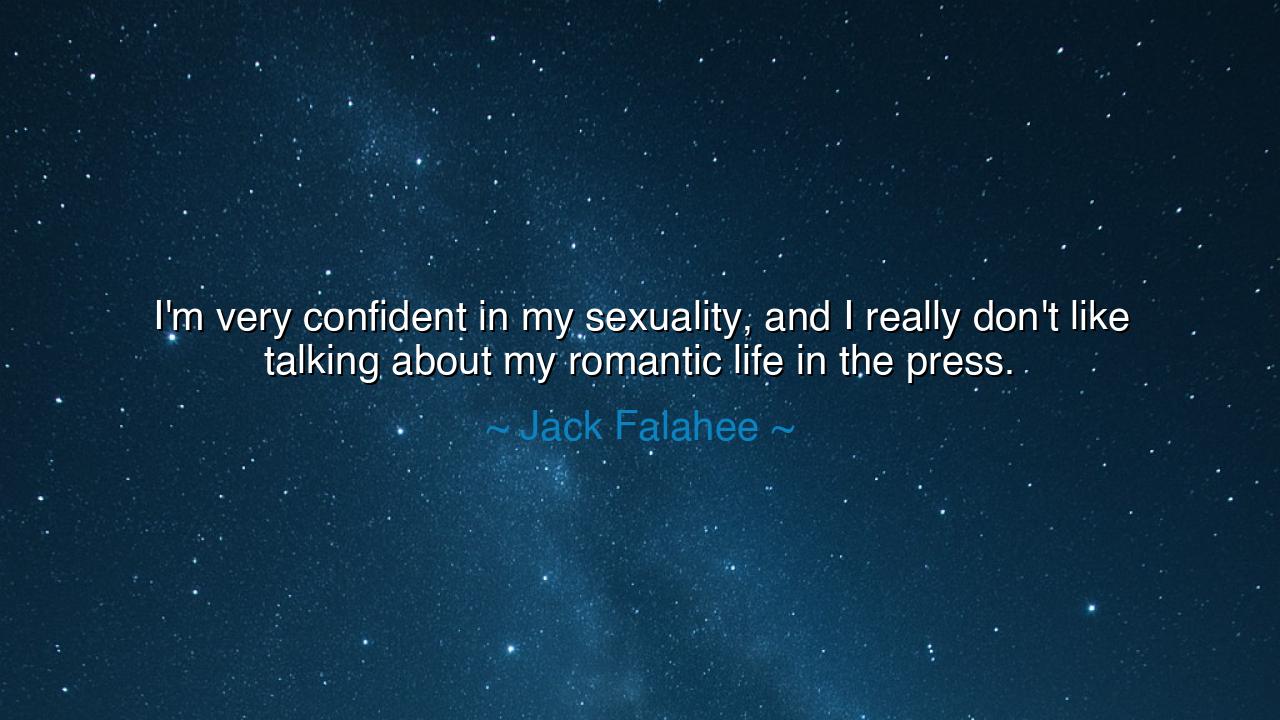
I'm very confident in my sexuality, and I really don't like
I'm very confident in my sexuality, and I really don't like talking about my romantic life in the press.






Jack Falahee, with a voice both firm and humble, once declared: “I’m very confident in my sexuality, and I really don’t like talking about my romantic life in the press.” These words are not merely the guarded statement of a man in the public eye, but a teaching about dignity, privacy, and the strength of self-knowledge. For he reminds us that true confidence does not demand constant proclamation, nor does love need to be paraded before the crowd. There is a sacredness in what is private, a power in keeping one’s heart unexposed to the noise of the world.
The ancients themselves understood this. The Greeks praised sophrosyne—self-control, modesty, and balance—as one of the highest virtues. They believed that a man who knows himself, who is secure in his being, has no need to trumpet it to others. Falahee’s words echo this ancient wisdom: to be confident in one’s nature is enough; to speak of it endlessly, or to lay one’s most intimate truths bare before the public, is neither necessary nor wise. For the heart is a sacred temple, and not every passerby deserves entry.
Consider the story of Greta Garbo, the actress of the silver screen who became legend not only for her roles but for her silence. She was pursued endlessly by the press, who sought to pry into her loves, her secrets, her inner life. But she gave them little, famously declaring, “I want to be alone.” Yet this silence was not weakness; it was strength. She guarded her romantic life as treasure, and in doing so, she preserved her dignity against the world’s hunger for gossip. Her confidence was not in what others said of her, but in who she knew herself to be.
In our own age, where every detail of private life is displayed upon glowing screens, this lesson becomes even more urgent. Many feel they must share their loves, their desires, their private moments for validation. Yet Falahee’s words stand as a shield against this temptation: confidence means not needing to explain yourself, and love does not become stronger when shouted from rooftops. Instead, it grows in the quiet places, in trust, in intimacy shielded from the eyes of strangers.
His words also remind us of the danger of public judgment. For when a man or woman reveals their romantic life to the crowd, it ceases to be wholly theirs; it becomes a spectacle, subject to commentary, distortion, and mockery. How often have we seen great figures, even noble ones, undone not by their deeds but by the way the press devoured their private affairs? To protect love, one must sometimes protect silence. To guard intimacy, one must draw boundaries. This is not fear—it is wisdom.
The lesson, then, is this: be confident in who you are, but do not feel compelled to bare all to the world. Know yourself, love yourself, and allow your deepest affections to remain sacred between you and those who share them. Learn to value privacy as a form of strength. For the crowd will always hunger for more, but you owe the crowd nothing of your soul.
So I say to you, seekers of balance: let your confidence shine quietly, without boast, without fear. Guard your romantic life as you would guard a flame in the wind—protected, unseen, but burning brightly. Follow Falahee’s example: speak what you must, but keep what is precious beyond the reach of idle tongues. For dignity lies not in exposure, but in restraint; and the love that is hidden from the crowd may, in truth, be the love that endures.






AAdministratorAdministrator
Welcome, honored guests. Please leave a comment, we will respond soon